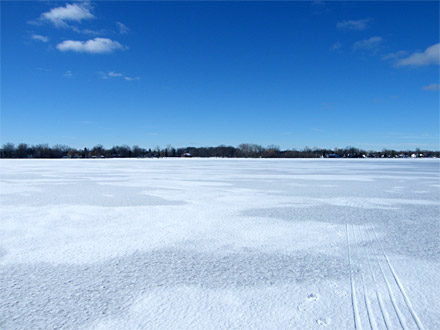

By Dan Kimmel on Feb 09, 2016 with Comments 0
Ice fishing is a fun activity even the family can enjoy. But ice fishing requires preparation and knowledge to enjoy the sport safely. Here are some safe ice fishing tips.

Ice covered lake, is it safe?
Ice conditions vary from lake to lake. Find a good local source that is knowledgeable about ice conditions on the lake you want to fish on. A local bait shop or fishing guide are examples. You want advice based on very recent experience on the lake.
You can’t always tell the strength of ice simply by its look, its thickness, the temperature or whether or not it is covered with snow. Clear ice that has a bluish tint is the strongest. Ice formed by melted and refrozen snow appears milky, and is porous and weak.
Ice covered by snow always should be presumed unsafe. Snow acts like an insulating blanket and slows the freezing process. Ice under the snow may be thinner and weaker. A snowfall also can warm up and melt existing ice.
If there is slush on the ice, stay off. Slush ice is only about half as strong as clear ice and indicates the ice is no longer freezing from the bottom. Be especially cautious where air temperatures have fluctuated. A warm spell may take several days to weaken the ice; however, when temperatures vary widely, causing the ice to thaw during the day and refreeze at night, the result is a weak, spongy or honeycombed ice that is unsafe.
There are inch-thickness guides and recommendations used by many anglers to determine ice safety. It isn’t a safety guaranty to go by those guides. A minimum of four inches of clear ice is required to support an average person’s weight on the ice, but since ice seldom forms at a uniform rate across the whole lake it is important to check ice thickness with a spud and ruler every few steps. The Michigan DNR does not recommend taking a car or truck out onto the ice at any time. We can’t safely recommend doing that either considering that ice rarely forms uniformly anywhere.
Things like current and springs can affect ice uniformity causing weak spots or open areas in any body of water. Your local sources may be able to tell you about such areas if they exist on the lake you plan to fish. Always assume such areas might exist and check unknown ice thickness as you move.
Also beware of items such as reeds, weeds, brush or other objects sticking through the ice. Some items gather heat or break up the ice uniformity creating weaker ice.
Before you venture on the ice, tell a responsible adult where you are going and what time to expect you back. Relaying your plan can help save your life if something does happen to you on the ice. Purchase a pair of ice picks or ice claws, which are available at most sporting goods stores. Keep them around your neck or in your top front pockets where you can get at them quick and easy. Also, take a cell phone for emergency use.
If you are walking out onto a lake with a group, avoid crossing ice in a single file. If you are with a group, avoid standing close together in a spot. Spread out.
Look for large cracks or depressions in the ice and avoid those areas. Test ice thickness with an ice spud before you settle on a spot.
Wear a life jacket and bright colored clothing. Remember ice does not form with uniform thickness on any body of water. Underwater springs and currents can wear thin spots on the ice.
Try to remain calm. Don’t remove your winter clothing. Heavy clothes won’t drag you down, but instead can trap air to provide warmth and flotation. This is especially true with a snowmobile suit.
Turn in the water toward the direction you came from – that is probably the strongest ice. If you have them, dig the points of the ice picks into the ice and, while vigorously kicking your feet, pull yourself onto the surface by sliding forward on the ice.
Roll away from the area of weak ice. Rolling on the ice will distribute your weight to help avoid breaking through again. Get to shelter, heat, dry clothing and warm, non-alcoholic and non-caffeinated drinks.
Call 911 and seek medical attention if you feel disoriented, have uncontrollable shivering, or any other ill effects that may be symptoms of hypothermia – the life-threatening drop in the body’s core temperature.
Filed Under: Featured • Ice Fishing Tips
About the Author: